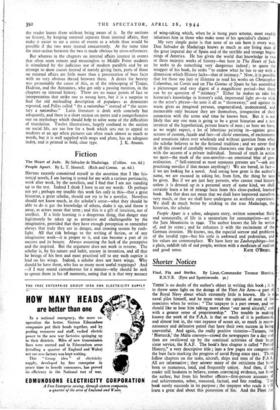Fiction
The Heart of Jade. By Salvador de Madariaga. (Collins. los. 6d.) People Apart. By L. T. Shortell. (Rich and Cowan. 9s. 6d.)
HAVING recently committed myself to the assertion that I like his- torical novels, I am having it tested for me with a curious pertinacity, week after week, by the novelists, and I find that I am not standing up to the test. Indeed I think I have to eat my words. Or perhaps not yet ; perhaps my trouble this week lies only in this—that a great historian, a great scholar, should not try to be a novelist. Novelists should not know much, in the scholar's sense—what they should be able to do is gut the knowledge of others, shake it up, and throw it away, as actors mean that term ; and this is a gift of intuition, not of intellect. If a little learning is a dangerous thing, that danger may legitimately be taken up as attractive and challengeable by the imaginative, provided that they have enough perception to remember always that truly they are in danger, and crossing oceans by rush- light. All that risk belongs to the writing of fiction, or of any imaginative work—it is proper to it, and can become a part of its success and its beauty. Always assuming the luck of the perceptive and the inspired. But the argument does not work in reverse. The scholar is, by his nature and habit, uneasy in invention, and all that he brings of his best and most practised self to any such caprice is lead on his wings. Indeed, a scholar does not have wings. Why should he have them, who has so many most useful trappings? And —if I may sound cantankerous for a minutewhy should he seek to sprout them in his off moments, seeing that it is that very menace
of wing-taking which, when he is being pure scholar, most readily infuriates him in those who make none of his specialist's claims?
My very simple point is that none of us can have it every way. Don Salvador de Madariaga knows as 'much as any living man of the great imperial day of Spain and of the terrible and strange begin- nings of America. He has given the world that knowledge in two or three majestic works of history—but here in The Heart of lade he seeks to do something very dangerous indeed ; to quote the wrapper of his book, he seeks " to endow what he has to say with a dimension which History lacks—that of intimacy." Now, it is possible that for those too lazy or illiterate to read his works on Christopher Columbus, on Cortes and on The Genius of Spain he has assembled a picturesque and easy digest of a magnificent period—but there can be no question of " intimacy." Either he makes us take his historian's knowledge in history's cold, impersonal light or—to stick to the actor's phrase—he uses it all as " throwaway," and against its waste gives us imagined persons, ungeneralised, undecorated, and memorable only because they are themselves, irrespective of their connexion with the scene and time he knows best. But it is not likely that any one man is going to be a great historian and a just inventor of the hypothetical, private hearts of men ; so here we have, as we might expect, a lot of laborious painting in—against great screens of custom, facade and fact—of cliché emotions, of excitements and sensations taken over wholesale and without question from what the scholar believes to be the fictional tradition ; and we never find in all this crowd of carefully written characters one that speaks to us with the accents of a private individual. Instead of truth in action we meet—the mark of the non-novelist—an emotional blur of gen- eralisation. (" Self-centred as most sensuous persons are "—ask any practising novelist if that means anything?) We are bored, in fact— if we are looking for a novel. And seeing how great is the author's name, we are excused in asking for, from him, the thing he says he gives. But if we are just lazy persons, who cannot read history unless it is dressed up in a personal story of some kind, we shall certainly learn a lot of strange facts from this close-packed, learned book. But that does not mean that we shall have improved ourselves very much, or that we shall have undergone an aesthetic experience. We shall do much better by sticking to the true Madariaga, the historian, the scholar.
People Apart is a sober, adequate story, written somewhat flatly and unnaturally, of life in a sanatorium for consumptives—set in the Jura Mountains in 1940. The author knows the life he writes of, and its scene ; and he enhances it with the excitement of the German invasion. He knows, too, the especial sorrow and problems of the invalid type—but his style is awkward and pedestrian, and his values are commonplace. We have here no Zaubergebirge—but a plain, saddish tale of sad people, written with a modicum of realism


























 Previous page
Previous page